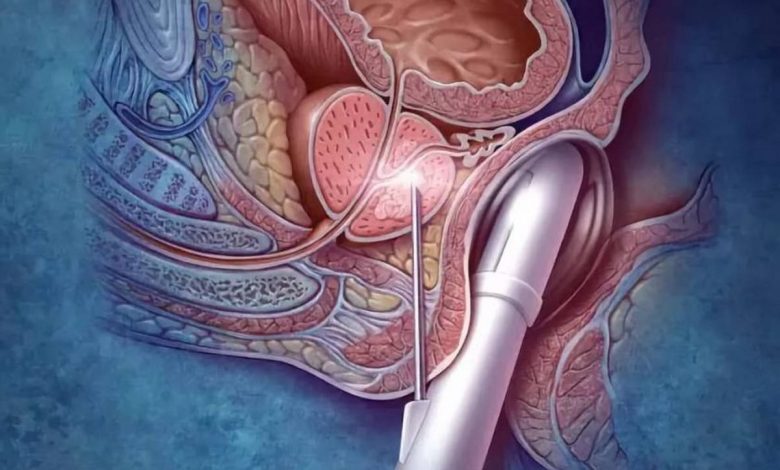Biopsy prostatы: what is the procedure, causes, Contraindications, how they do it, what after

Description prostate biopsy
Biopsy prostatы – removal of a small amount of the prostate tissue is studied zhelezy.Tkan, to determine the presence of cancer.

Reasons for prostate biopsy
A biopsy of the prostate is usually performed as a result of finding abnormalities in the following tests:
- Digital rectal analysis;
- A blood test for the presence of prostate specific antigen.
Prostate biopsy is the only way to determine the presence of cancer cells in the prostate gland.
Possible complications when performing prostate biopsy
Complications are rare, but no procedure does not guarantee the absence of risk. Before, how to perform a prostate biopsy should be aware of possible complications, which may include:
- Infection;
- Bruising or prolonged bleeding from the rectum, blood in urine or semen;
- Difficulty urinating.
Factors, that may increase the risk of complications:
- Smoking;
- History of bleeding disorders or bruises;
- The use of certain medications or dietary supplements;
- Sensitivity or allergy to latex, drugs or anesteziyu.
How is prostate biopsy?
Preparation for the procedure
Before the biopsy, do the following:
- Sometimes, a week before the procedure, you must stop taking certain drugs:
- Aspirin or other anti-inflammatory drugs;
- Blood thinners, eg, clopidogrel (Plaviks) or warfarin (Kumadin);
- Start taking antibiotics, recommended by the doctor;
- Put an enema several hours before the procedure;
- If using general anesthesia, there is nothing to eat or drink after midnight the day of the biopsy.
Anesthesia
- Transuretralynaya biopsy and biopsy promezhnostnaya:
- General anesthesia – blocks pain and the patient support in sleep. Administered intravenously in the arm or hand.
- Local anesthesia – It applies only to the area of pain relief, which is subjected to the procedure;
- Transrektalynaya biopsy prostatы – Local anesthesia is used.
Procedure prostate biopsy
The doctor uses one of the following methods:, to do a biopsy of the prostate:
- Transrektalynaya biopsy (the most common method) – the doctor inserts a small ultrasound device into the rectum. This device will emit sound waves and allows to obtain an image of the prostate gland, which will help determine the location for needle insertion. Then the doctor inserts a needle through the wall of the rectum into the prostate gland and produces the selection of the sample;
- Transuretralynaya biopsy – doctor inserts a flexible tube with a camera and the illumination device through the penis into the urethra and produces the selection of material using a cutting loop, which is introduced through the tube;
- Promezhnostnaya biopsy – the doctor makes a small incision in the perineum. Perineum – the area between the scrotum and the rectum. Further, the prostate small needle is inserted, to make a selection of the biopsy material.
How long will the prostate biopsy?
About 30 minutes.
Will it hurt during a prostate biopsy?
After the biopsy site in the sampling may feel pain or tenderness. If necessary, your doctor may prescribe painkillers.
Care after the procedure, a biopsy of the prostate
When you return home, you need to perform the following actions, to ensure the normal recovery:
- Avoid dehydration. It is necessary to drink plenty of fluid for several days after the biopsy;
- Avoid strenuous exercise during the day and in the evening after the procedure;
- It should be borne in mind, Several days after the procedure in the urine may be blood or ejaculate;
- We need to ask the doctor, when you can resume taking blood-thinning medicines;
- We need to ask the doctor when it is safe to shower, bathe or expose the cut by water;
- Be sure to follow your doctor's instructions.
After sampling, it will be sent for analysis, for cancer detection. If cancer is present, the doctor will develop a treatment plan or refer the patient to specialists.
It is necessary to go to the hospital in the following cases
- Inability to urinate;
- Blood in the urine of more than one 2-3 days after the biopsy;
- Signs of infection, including fever and chills;
- Inability to relieve pain using painkillers;
- Pain, burning in the bladder, frequent urination;
- Cough, shortness of breath or chest pain;
- Persistent rectal bleeding or bleeding from the rectum, that lasts more 2-3 days after the prostate biopsy.
